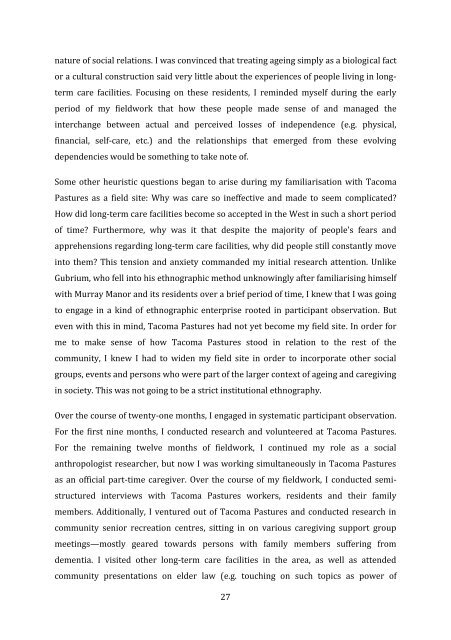Philip Y. Kao PhD thesis - Research@StAndrews:FullText
Philip Y. Kao PhD thesis - Research@StAndrews:FullText
Philip Y. Kao PhD thesis - Research@StAndrews:FullText
Create successful ePaper yourself
Turn your PDF publications into a flip-book with our unique Google optimized e-Paper software.
nature of social relations. I was convinced that treating ageing simply as a biological fact<br />
or a cultural construction said very little about the experiences of people living in longterm<br />
care facilities. Focusing on these residents, I reminded myself during the early<br />
period of my fieldwork that how these people made sense of and managed the<br />
interchange between actual and perceived losses of independence (e.g. physical,<br />
financial, self-care, etc.) and the relationships that emerged from these evolving<br />
dependencies would be something to take note of.<br />
Some other heuristic questions began to arise during my familiarisation with Tacoma<br />
Pastures as a field site: Why was care so ineffective and made to seem complicated?<br />
How did long-term care facilities become so accepted in the West in such a short period<br />
of time? Furthermore, why was it that despite the majority of people’s fears and<br />
apprehensions regarding long-term care facilities, why did people still constantly move<br />
into them? This tension and anxiety commanded my initial research attention. Unlike<br />
Gubrium, who fell into his ethnographic method unknowingly after familiarising himself<br />
with Murray Manor and its residents over a brief period of time, I knew that I was going<br />
to engage in a kind of ethnographic enterprise rooted in participant observation. But<br />
even with this in mind, Tacoma Pastures had not yet become my field site. In order for<br />
me to make sense of how Tacoma Pastures stood in relation to the rest of the<br />
community, I knew I had to widen my field site in order to incorporate other social<br />
groups, events and persons who were part of the larger context of ageing and caregiving<br />
in society. This was not going to be a strict institutional ethnography.<br />
Over the course of twenty-one months, I engaged in systematic participant observation.<br />
For the first nine months, I conducted research and volunteered at Tacoma Pastures.<br />
For the remaining twelve months of fieldwork, I continued my role as a social<br />
anthropologist researcher, but now I was working simultaneously in Tacoma Pastures<br />
as an official part-time caregiver. Over the course of my fieldwork, I conducted semistructured<br />
interviews with Tacoma Pastures workers, residents and their family<br />
members. Additionally, I ventured out of Tacoma Pastures and conducted research in<br />
community senior recreation centres, sitting in on various caregiving support group<br />
meetings—mostly geared towards persons with family members suffering from<br />
dementia. I visited other long-term care facilities in the area, as well as attended<br />
community presentations on elder law (e.g. touching on such topics as power of<br />
27
















